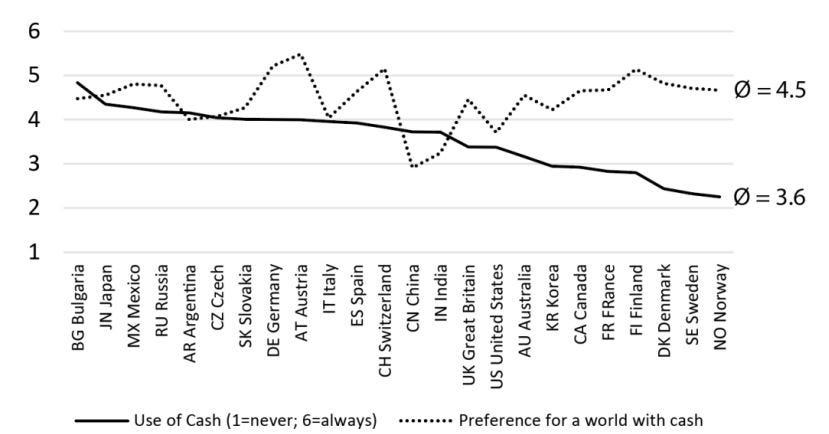Cash is still king – at least emotionally
Before my summer break, I was discussing the efforts by central banks to introduce digital currencies. The last part of that series mentioned that one reason why central bank may want to do that is that with a universally accepted central bank digital currency, the abolition of physical cash may become a practical possibility.
Of course, we are far away from that scenario, because cash is still in widespread use in most countries, but I think, even if the use of cash declines, it will still be very hard, not to say impossible to abolish physical cash.
I searched the internet a little bit about studies on people’s attitudes about using cash and came across this survey of c.10,000 people in 24 countries and their attitudes towards cash. Part of the survey was to ask people in each country whether they are open to living in a world without physical cash or whether they would like to have at least the possibility to pay with cash. And it turns out that by an overwhelming margin of 3:1, people would like to keep cash instead of abolishing it altogether.
Attitudes towards the abolition of cash
Source: Lieven (2021)
But attitudes about the abolition of cash vary quite a bit. In Anglo-Saxon countries and Scandinavia people said they would like to be able to use cash because it gives them a feeling of freedom and individualism. After all, nobody can check how you decide to spend your money. Meanwhile, in Eastern European countries and Latin America, the ability to hold physical cash provides mostly a feeling of safety because nobody can take that cash away from you and it has a stable (nominal) value. Given the history and political situation in many of these countries, this impulse to hold cash as a safe portable asset is understandable. And in Western European countries the attitude towards abolishing cash is particularly negative because for these people, both the freedom argument and the safety argument rate high, though not as high as in the two other regions individually. The fear of surveillance and the need for stability and safety is particularly pronounced in Germany, Switzerland and Austria, the three countries with the highest aversion to the abolition of cash.
And then there are China and India, the only two countries where there is a plurality in favour of abolishing cash…
One might say that in China the use of cash is in fast decline and that people just got used to not having cash, but when looking at the use of cash in daily life and comparing it with the attitude towards the abolition of cash, there is no trend visible. The aversion against abolishing cash is just as high in Sweden and Norway as it is in Japan and Mexico, though cash usage is vastly different.
Actual use of cash vs. preference for a world with cash
Source: Lieven (2021)





